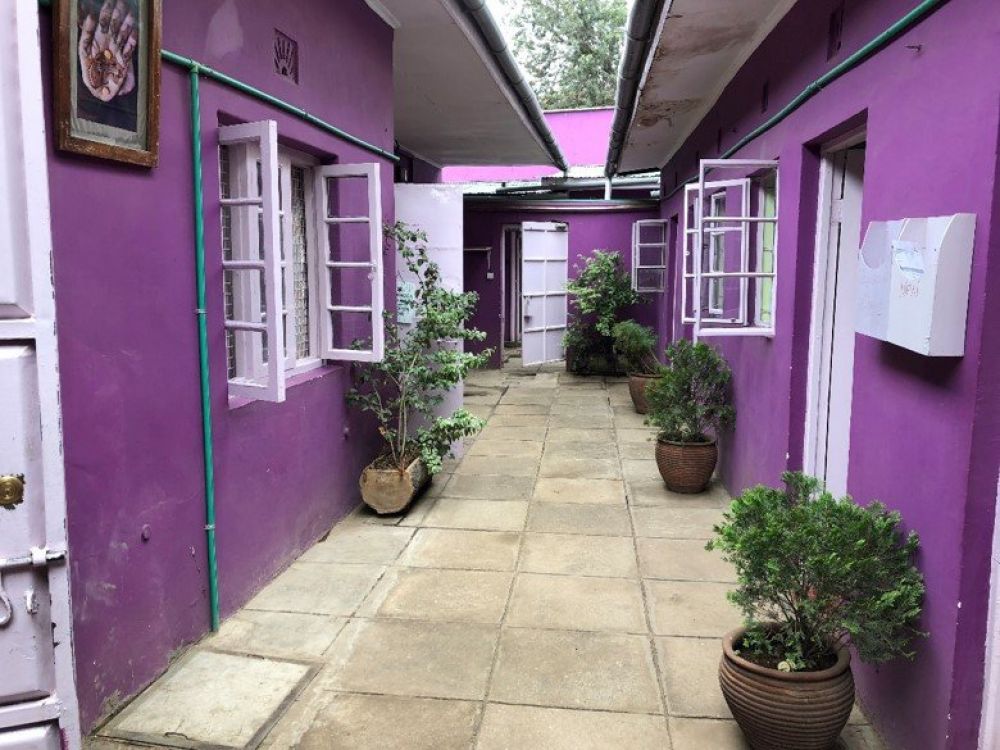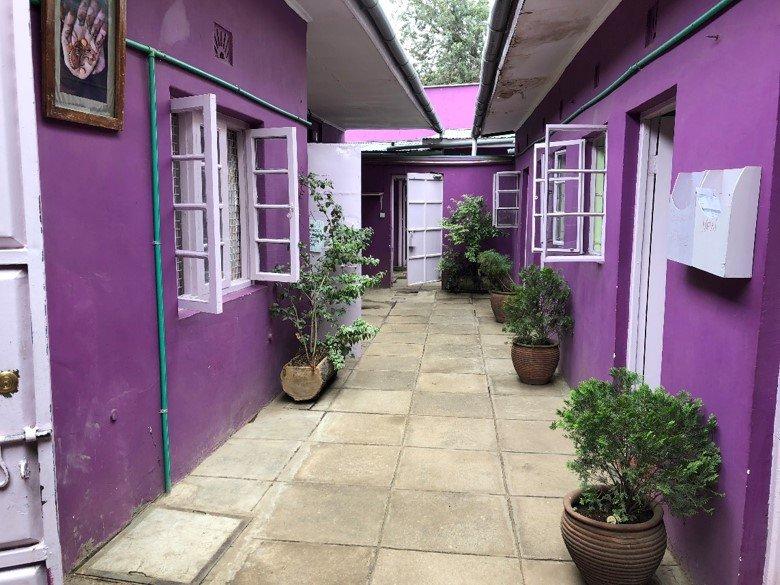The Lavender House offers a lifeline for medical emergencies in eastern Nairobi, especially after dark.
By 6:30 pm the sun has set over Nairobi, its trajectory almost imperceptible in the evening haze. No matter—this close to the equator, the night begins predictably year-round, every 24 hours. So to the night shift at the Doctors Without Borders Lavender House.

Since 2014, the lavender-coloured building on Eastlands’ Juja Road has housed a 24/7 emergency department (ED) in addition to the longer-standing sexual violence clinic, providing cost-free care to people living precariously in the Mathare and Eastleigh slum areas.
A medical emergency can happen any time of the day, yet, a few kilometres east of the Kenyan capital, fewer ambulances and poorer security are just two of the night-time obstacles to reaching care. To help overcome these, Lavender House takes calls on two toll-free hotlines whatever the hour, with four ambulances on standby for immediate dispatch.
6:45 PM
The night shift officially starts at 7 pm, and the clinic is abuzz. Patient registers need to be filled, ambulances cleaned and restocked, and caseloads tallied. A sense of relief mixes with expectation as watchmen, triage nurses, call centre team leaders, paramedics, ambulance drivers, clinical officers and counsellors huddle in each service area completing handover.
7:28 PM
When call centre team leader Ruth Symekher answers the phone, a man has just been struck by a speeding motorbike “down near the big roundabout” and now lies on the roadside, unresponsive. Zulu One heads east, siren blaring to carve a path through the obstinate traffic.
A crowd has gathered, and several young men chat with ambulance driver Noah Imbugwa while the two paramedics administer tramadol and prepare a splint for the inert man’s broken leg. “We don’t know what would have happened to him if you hadn’t come,” says one and when Noah explains MSF’s free service, they plug the hotline number into their phones.
The patient is eventually stabilised and ready for transfer to Mama Lucy Kibaki Hospital emergency department. As Zulu One leaves “Mama Lucy” just before 8:40, Zulu Two and Three are driving in—it’s been a busy start for everyone.
7:30 PM
Josphine Wanjoru, the community support assistant for sexual violence, is responding to calls to the sexual assault hotline tonight. A young woman is the first to call, from the police station where she has just reported being raped. The attack involved a man she knew and trusted—a common theme among Lavender House patients.
MSF also supports another sexual violence service closer to where the woman waits, so Josphine heads out with driver Joseph Omusi to transfer her there. She’ll be counselled and medically checked by a trained nurse-counsellor before Josphine will pick her up again to help her home.
This outreach service is particularly valuable at night for victims who would otherwise feel too unsafe to seek care, and need psychological support to make their way.
9:40 PM
Driving through Mathare it’s easy to find children of all ages banded together as “street families” to survive. Highly vulnerable, they’re received at Lavender House with an open door for any health need.
Tonight, the first to arrive is a distressed young boy, brought in by two friends, his clothes the same dirty brown from head to toe. Hit on the nose by a flying bottle, he writhes, pants heavily and cries out on the trauma room bed. On assessment nothing is broken but based on the World Health Organisation pain ladder, his pain score was high.
11:25 PM
Round midnight, the tea room light shines weakly against the now much darker sky. A clutch of staff is “dining-in”, re-energising with lunchbox meals brought from home. There are several reasons why Lavender House rosters just two 12-hour shifts per day. One of the most important is staff safety, helping staff travel in reasonable light whether clocking on or off.
2:55 AM
In the Lavender House courtyard, counsellor Zaina Ahmed has finished writing up the notes for her two sexual violence cases so far, the older a 10-year-old girl. Sworn to secrecy by her abusive stepfather, she has been brought by her older sister, who has identified what has been going on.
The young girl’s testimony suggests another sister may be at risk—but their mother remains unaware. Zaina explains how difficult the revelation can be in cases like this: “The mother also needs a lot of support.”
3:27 AM
The night’s first obstetric emergency is in a nearby health centre, where a breech baby is causing trouble for her labouring mother, and panic for the attending midwife. Emergency medical technician Dennis Odour later explains, “By the time Zulu Two got there, both legs and the baby’s bottom were out.
The mother kept pushing and was eventually able to deliver. The baby didn’t make a sound at first but to everyone’s relief, she was soon crying.”
5:35 AM
Friday night excesses have started to reveal their toll. A younger man walks in with blood still flowing from a wound inflicted an hour before. In a fight at the casino, he has ended up with a bottle of frothy beer smashed on his head—a Friday night scenario equally easy to imagine in Sydney or Auckland. With the wry voice of experience, trauma nurse Isabella Jumba sums up: “We see a cocktail of cases”.
6:20 AM
Sunrise brings to the ED an elderly woman, small, thin and critically ill, carried straight off a crowded bus in the street outside. Struggling with pneumonia, she lies limp on the bed as the trauma room staff prepare fluids and insulin for her diabetes.
Her adult children hover worriedly. As a red case, once stabilised, she’ll be transferred for higher-level care. She’s the last patient in the night shift tally and, thankfully, the only red case for the night.
Find out about MSF's activities in Kenya
